The Dark Knight Rises: In Defense of the Plot Twist
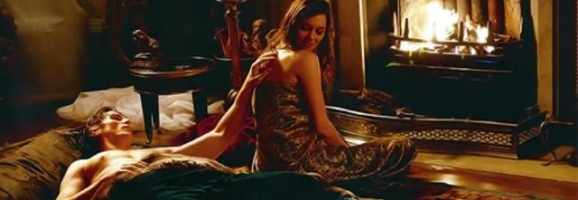
Some articles have attacked The Dark Knight Rises (2012) for its plot twist. Many complain that the plot twist ruined the movie by destroying Bane’s earlier character development and making him into Talia’s puppet. While others refute these claims – saying that Bane has done a lot independently from Talia and is likely not solely motivated by love for Talia – this article will go in a different direction. This article is in defense of the plot twist, but since the opposition has already been addressed, this article is about what makes the plot twist not just excusable but excellent.
Warning: The rest of the review contains spoilers for several films: The Dark Knight Rises, Lucky Number Slevin (2006), The Usual Suspects (1995), and The Sixth Sense (1999).
The Sixth Sense is praised for its twist ending. Time and time again people praise the ending because the clues were there the entire time, and yet the audience never picked up on them. They were subtle, below the radar, and still increasingly important and even at times troublesome. “[Y]ou’d kick yourself for not working this one out,” the latter article says. It’s amazing how so many of us didn’t realize before the twist that he couldn’t open doors, or that his wife seemed to ignore him, or that no one but the kid ever talked to him. Also, evidently, his wedding ring was missing when he was a ghost.
There are a lot of movie plot twists where the clues don’t add up. In Lucky Number Slevin, the main character is foreshadowed to be a liar because he miscounts the number of bad things that happened to him, but an equally possible explanation is that his character is clumsy. Further, in order to meet the mob bosses, he poses as someone mistaken for someone who owes money rather than just someone who owes money. This choice only seems to make a difference to the romantic interest, but when he invents the lie, she’s still a nobody. Or in The Usual Suspects, the twist is that everything was a lie (not just some of it), but the movie makes just as much sense when only some things are lies. Roger Ebert says of The Usual Suspects, “[T]he ‘solution,’ when it comes, solves little.” These aren’t bad twists, but they lack a certain satisfaction that the ending to The Sixth Sense has.
To borrow one author’s word for it, The Sixth Sense’s ending feels “inevitable,” or as Roger Ebert puts it, “[T]he movie hasn’t cheated.” The clues all stack up and then when the ending happens, you feel like everything makes so much more sense. It’s easy to surprise people with a twist. It’s harder to have a twist that is absolutely necessary to understand a film, and yet have that twist still be surprising. The Dark Knight’s twist is exactly that: inevitable, yet surprising. And it is inevitable because before the plot twist there are a number of inconsistencies.
Inconsistencies Within the Film
Some of these inconsistencies appear as plot holes. For example, there’s Bane’s line to Daggett about his plan. When Miranda Tate gets control of Wayne Enterprises, John Daggett is furious. Bruce has used Wayne Enterprises to develop a form of energy that Bane wants to use to build a bomb, and Daggett was a man working with Bane and also bidding for control of Wayne Enterprises. The audience thinks Bane will use Daggett to get the energy source without attracting too much attention. However, Bruce knew what was going on with Daggett and got the board of Wayne Enterprises to back Ms. Tate, so she’d get control of Wayne Enterprises and the energy source. He even shows Ms. Tate a flood fail safe to drown the energy source should it be necessary. When Mr. Daggett complains that everything has gone wrong, Bane calmly tells him that this was the plan the whole time.
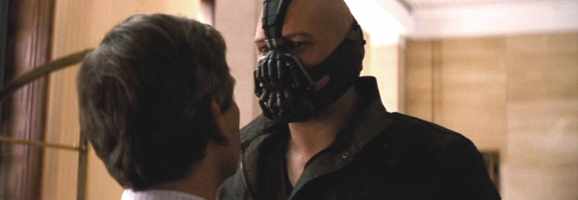
The audience is inclined to forget this problem. Villains seem to say too often that something is according to plan. Besides, Bane manages to steal the energy source later, though perhaps it is surprising that he knows where it is. But he’s a super villain, and the movie moves quickly enough that you can accept as an explanation, “He’s just really good at what he does.”
And then there’s the issue of the child. Bane is supposedly the child who escaped from the pit (a prison where a whole community has developed and where, if you can climb to the top, you can win your freedom back), but Bane can’t be that child. Bane himself says, “I did not see the light of day until I was a man,” and so he didn’t escape, according to his reckoning, until he was older than a child. Also, the prison doctor fixed Bane’s face, but the child in the flashbacks has no facial problems when he escapes. (Actually, it’s a she, not a he, but more on that later.)
Still, there’s reason to accept these problems as something other than plot holes. After all, the Joker had multiple explanations for his scars. At this point in the film, the audience should think it’s perfectly logical to assume the multiple versions of the story exist to make the story seem more based in legend than in fact. Most people never suspect that there’s a simpler reason for the inconsistency.
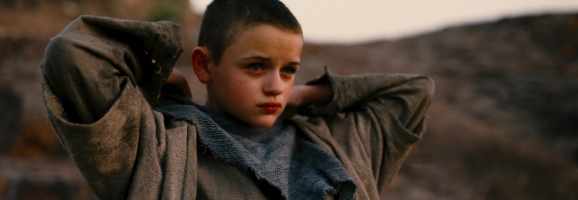
The audience may also notice some unusual occurrences with Ms. Tate. After the crew of police officers and Ms. Tate are caught, when they are all taken to be tried, Bane singles her out and pulls her aside. Why won’t he let her die with the rest of them? More strangely, after she sleeps with Bruce and she starts looking at the fire, she begins to say some odd things. She talks about not having electricity growing up, for example. What’s that supposed to mean? Then Bruce notices a scar on her back. She explains the scar, but only briefly. And then, much later, when Bruce comes to save Fox, who has been captured by Bane, Fox asks if they can save Ms. Tate too. Bruce says he cannot save her yet, and Ms. Tate says that’s okay. Except she says it in a very particular way. She says, “Do what is necessary.”
Which sounds familiar. Because it is. Because it’s what Ra’s al Ghul (the villain of Batman Begins) tells Batman; it’s actually what Batman and Ra’s al Ghul disagree about. In the first movie, Ra’s keeps saying, “You have to be prepared to do what is necessary.” The Dark Knight Rises makes Ra’s center stage again because Bane trained under him. The line, “Do what is necessary,” should be on an audience member’s mind, but the film hides it by putting it in an entirely different context. By “Do what is necessary,” Ra’s means kill people, but Ms. Tate’s line carries no such implications in the situation at hand.
Finally, right before the twist, the heroes arrive at the wrong truck. This is significant because Ms. Tate is the one who used their technology to mark the truck that had the bomb in it. But this problem occurs in the middle of two intense action scenes, and the audience doesn’t get a chance to process what the issue could be. So far as the audience knows, Bane is just an exceptionally clever villain who managed to trick the hero’s technology. At any rate, the characters are more concerned about finding the right truck than asking questions about the wrong one.
Then the twist: Ms. Tate reveals herself to be Talia al Ghul – that is, a villain on Bane’s side and the daughter of Ra’s al Ghul, the first movie’s villain. Suddenly, the plot makes sense.
It was according to plan when Talia gained control of Wayne enterprises. It gave her (and Bane, her partner) access to the bomb and the flood fail-safe technology (which they use against Fox when he tries to stop the bomb). Bane did not see the light of day until he was a man because he’s not the one who escaped the pit. Talia was the child (born in the pit – hence no electricity growing up, hence the scar) who escaped. Bane doesn’t try to kill her with the police officers because she’s on his side. Talia echoes Ra’s because he’s her father and because she trained with the League of Shadows. Finally, Talia marked the wrong truck because she didn’t want the heroes to succeed.
Now there’s no plot hole. Now the movie makes sense.
Inconsistencies with the Comics
The movie before the twist also seems remarkably different from the comics. The problem is that Ra’s al Ghul’s child is a daughter, not a son. During Bruce’s stay in the pit, he begins to think that Bane is the son of Ra’s because Bane was born in the prison and Ra’s’ wife was lowered into the prison while pregnant. But in the comics, Talia is Ra’s’ child, and Talia has a full and complicated history.
Before the twist, there is some grounds for comic fans to believe Bane is Ra’s’ kid. In “Knightfall,” Bane’s origin is explained. He was the son of a revolutionary, and he lived in prison from the time he was a small child in place of his father. In the movie, Ra’s does not go to prison because his wife, who is pregnant with their child, takes his place. Still, replacing Talia with Bane would be a major change for the film to make.
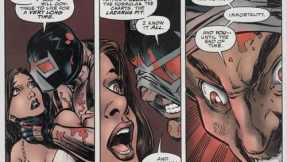
So what do the comics say about Talia? Interestingly, for a time Ra’s wants Bane to marry Talia and take over the League of Assassins (which Nolan renames the League of Shadows). It should be noted, however, that Batman Incorporated season 2 makes her into the primary villain, so she is much more than just someone for her father to marry off. In fact, in Volume 2 #2 of that series, Talia even takes control of her father’s men away from her father. Also, Talia has a complicated romantic history with Bruce Wane that even results in a child, Damian.
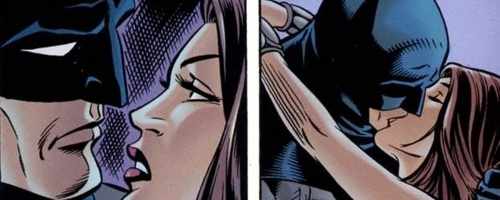
The Talia in the film seems to pay some tribute to this background. She’s in a relationship with Bane, which is different from how it turns out in the comics, but the comics do depict a time when they have an alliance and Bane exhibits interest in her. Also in the film, she’s cunning and has a master plan that is based on her father’s organization. She even seems to have a fling with Bruce, though in the context of the film, that was likely a part of making him trust her. Still, the comics share some of this double-motivation in the Bruce-Talia romance. For instance, in “Son of the Demon,” it is revealed that Ra’s performed a marriage between Bruce and Talia to try to stop Bruce from interfering with him. Therefore, when it is revealed that Ms. Tate is Ra’s child instead of Bane, the movie has more consistency with the comics. The movie makes more sense.
And that is ultimately what makes the twist inevitable. There are all these plot holes and problems with the movie that are fixed by the twist. Once the twist happens, you realize the movie doesn’t make sense any other way. Calling the twist Sixth Sense caliber might be bold, but The Dark Knight Rises has earned it.
What do you think? Leave a comment.











Just rewatched Street of Crocodiles and it is as brilliant — and unsettling — as it was years ago, when I saw it on a late night TV broadcast.
I have a weird theory that you might refute or accept. Batman has been portrayed in the first 2 movie as the devil. yes i know this might sound a bit off. but please read into these facts:
1- He took the blame for something he didnt do and people hate him without understanding what actually happened (Satan and God story).
2- Dark, Underground, with two horns (i know this is how batman is, but notice how he is portrayed in the movie when scarecrow gases the city)
3- One line taken from the first part – The thug says i swear to god, batman goes crazy and says SWEAR TO ME.
4- LUCIOUS fox, th fox of lucifer helps him out all throughout.
5- The joker portrays GOD and not satan, as he gives the choice, enjoys chaos and waits for people to choose by themselves.
In the dark knight rises, he is portrayed as the hero being awaited by many, in one part of the movie a kid scribbles 6 6 6 beside the batman signal while Robin is talking to him, he gave his life to humanity and lived again – The actual belief of Satanism.
This and many many other signs that i cannot remember now.
I personally never noticed a Satanist subtext, but it would make an interesting reading. I’m not sure about the Joker as God though – especially because he was going to blow up a boat when they didn’t blow each other up.
I liked Banes character in the movie, and i loved the plot twist, that Talia was the one that broke out of the prison, with the help of the person who loves her, BANE.
The plot twist didn’t change my view that much because him saving the girl was back then. Him killing people is now. That was then this is now.
i like his origin story from the comics better, and like, where was his teddy bear in the movie?!
By Nolan (who did a superb job, however, and is an excellent director, imho) you could definitely expect more as a final of this trilogy, some part of it just screams “amateur”.
The ending was definitely sloppy, especially by Nolan standards, but I felt it was about as good an ending as any trilogy will ever get.
One thing I noticed going into Dark Knight Rises is that everybody actually had negative expectations for it. Such things are to be expected for a third film (“oh, it won’t be nearly as great no matter how good it is,” and other defeatist opinions were everywhere on the forums I frequent), but I went in neutral. I decided to judge the film on its own merits, and as such I decided not to rewatch either of the previous films (I try to always watch the previous film in a series before watching the new one, especially when it’s been years since I saw the former).
Overall? Well, naturally, it’s not up to Dark Knight standards. But Dark Knight wasn’t golden either, and this was still a damn good movie. Even Catwoman turned out to fill a surprisingly important role up until the point where she broke character and kissed Batman. The forced mention of “Robin” was completely unnecessary. It was enough to see Blake stepping into the Bat Cave.
I had a lot of issues with the inconsistencies with the film, but the plot twist certainly was not one of them. Up there with my complaints is replacing a Latino character with a white man. There needs to be more minority representation and it bugs me that Nolan took that away. The performance was superb, but still…
My first time watching the film the plot holes didn’t bother me as much, but after seeing it a few more times, this article makes a lot of sense to me.
I had never noticed the language of “Do what is necessary” nor the point about the decoy truck. These are certainly subtle, significant bread crumbs. However, I disagree that the twist is as effective as that in the Sixth Sense. I think this is due to a lack of an emotional impact; does the audience really care what happens to Talia? The end result of the film is still the same: Batman disposes of the bomb and saves the city. The twist in the Sixth Sense dramatically alters the ending, changing the emotional context.
I think you may be ignoring one of the more iconic movie tricks, the red herring.
Bruce assumes he is hearing the origin of Bane, this is the red herring, it is put out there to throw the viewers off.
You are spot on with your analysis of the tracking beacon. There are no moments of reflection in the film to let some of these things settle in.
Lifelong fans of the comics likely do not need much explanation at all when they hear that Ms. Tate is Talia.
The Bane in this film is very different from the Bane in the comics and more recently the Bane from Young Justice that has gotten extremely popular.
I think the entire trilogy needs to be examined as a separate entity rather than a comic movie. It borrows some elements of comics but is not an adaption of a greater story.
I liked what you said about the ending answering many questions and filling in plot holes. I didn’t notice any of these the first time. Bane was one of my favorite comic book anti-heros and I ended up liking Bane even more in the film. His combination of incredible intelligence and strength was something that Nolan captured well. Bane ended up being an astounding villain in the film, successfully taking over the entire city of Gotham and because of how powerful he is, he became my favorite character in the film. Though it’s revealed that Miranda essentially orchestrated all of this we still watched Bane do all the dirty work and he took over the city with almost no help from her.
I don’t think it’s a problem that Miranda was working with Bane and was a villain the whole time. This was an unexpected and exciting twist but I don’t like the way Nolan treats it. The film basically acts like she has been doing it all and Bane was simply a foot soldier. I wouldn’t mind it if Nolan treated it more like Bane and Miranda were doing it hand-in-hand and were equals in this but instead the final half hour or so of the movie pushes Bane out of our minds and forgets about him. The scene where Miranda tells Bruce the truth makes it seem like she did everything herself. While she is revealing her plans Bane is sort of in the corner cowering and she pets him like a little kid. We have seen how powerful and genius Bane has been throughout the film and in my opinion he did far more in the fight against Batman than Miranda. I like the twist a lot and think it explains a great deal, I just dislike how the attitude of the ending almost discounts Bane as being the great force he was.
I like the inconsistencies that you’ve pointed out because some of them I didn’t really pick up on till now. To me, it definitely makes the twist better.
As someone who never read the comics before I saw the film, I most definitely did not see the twist coming. However, I would have to agree with you- it made perfect sense to me, considering all the clues left out for us. I thought Marion Cotillard did a wonderful job playing her; Ms. Tate appeared to be kindhearted and empathetic but she definitely had an edge, and later this edge proved to be her true identity as Talia. She essentially had to play two roles and I thought she did a good job of ensuring that the first would transition nicely to the second.
Wow–lots of research and attention to detail in this. I agree with everything you said and I think this piece does well to highlight the specificity that goes into all of Nolan’s work. It can be frustrating when people misunderstand these “plot holes” to be a reflection of bad storytelling, instead of working towards a larger revelation at the end. Really well written. Would love to see you tackle Inception, too.
Although I still do not love the twist of Talia being the mastermind behind everything and having Bane be something of a second fiddle, the research that you did really did make the twist itself much more worthwhile. THe one that particularly stands out to me is the repetition of “Do what is necessary.” That is clearly a callback that I can see Nolan really wanting to be there to help guide the audience, and the fact that so few have caught it is really impressive on your part. Well done.
See, I get what you’re saying, and found the article a really interesting read, but this film was just TOO heavy with the plot holes.
I mean, it was ‘revealed’ to Batman that Bane was the child of Ra’s al ghul in a dream Batman has, which is then treated as fact. I don’t know, it just took me out of a movie I was genuinely trying to enjoy as much as its predecessors.
I thought that the DKR twist was a great way to have some fun with bat-fans’ expectations for the characters and plot. We didn’t need a faithful recreation of Knightfall on screen. DKR was entertaining because of its subversion of fan-knowledge and entertaining despite.
you are right, i never noticed the plot holes when I watched it at first and it sure seems like the plot twist makes the movie have more sense. I still dont get the point of Anne Hathaway in the movie though, apart from her being with Bruce in Florence in the end. But that could have been any intelligent girl someway related to Bruce, right?